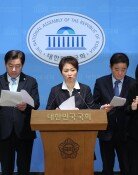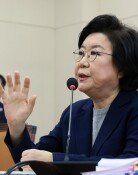Mixed Expectations of 30-minute Bush-Roh Summit
Mixed Expectations of 30-minute Bush-Roh Summit
Posted May. 13, 2003 22:15,
Prior to the summit between South Korean President Roh Moo-hyun and U.S. President George W. Bush, authorities were holding cautious attitudes, such as putting emphasis on the importance of ROK-U.S. relations. This was based on the conclusion that the meeting would play an important role for the future of the two nations alliance.
Complaints made by the U.S. administration in the preparation process for the summit reportedly put pressure on the South Korean government. Many experts say that the scheduled summit is only 30 minutes, unlike past summit meetings between Seoul and Washington, reflects Washingtons impatience and resolve on the strained relationship. In fact, there is talk that the U.S. initially proposed 15 minutes, but South Korean officials went to great lengths to increase the time.
It is difficult to expect that the one-hour working dinner scheduled for the two leaders, which South Korean officials put a positive spin on, will bear any fruit because the leaders cannot truly and fully exchange opinions over the formal meal.
Conscious of some limitations in the summit, the South Korean government is trying to focus more on substance. In order to produce substantive talks, presidential aides analyzed factors that drove the 2001 summit between former President Kim Dae-jung and Mr. Bush to failure. According to the analysis, the two leaders took part in the talks without having much knowledge of each other. As a result, they failed to take the proper approach with regard to policy lines on the Korean Peninsula. Former President Kim Dae-jungs confidence after winning the Nobel Peace Prize also may have contributed to the failure.
This time, the government has given priority to confidence building, a more practical approach.
However, it is difficult for the two leaders to see eye to eye on the North Korean nuclear issue even if confidence is restored. This is because hard-liners within the Bush administration are insisting on sticks, rather than carrots, in their view of Pyongyang. In particular, in the run-up to the summit meeting, some U.S. newspapers, including The New York Times and The Washington Post, ran articles that showed their negative views towards North Korea.
Such a negative understating of the North by the whole nation presages a bumpy road to the two nations fine-tuning of their policies on North Korea.
Young-Sik Kim spear@donga.com






![하버드 의사가 실천하는 ‘뇌 노화 늦추는 6가지 습관’ [노화설계]](https://dimg.donga.com/c/138/175/90/1/wps/NEWS/IMAGE/2026/01/22/133210626.3.jpg)
